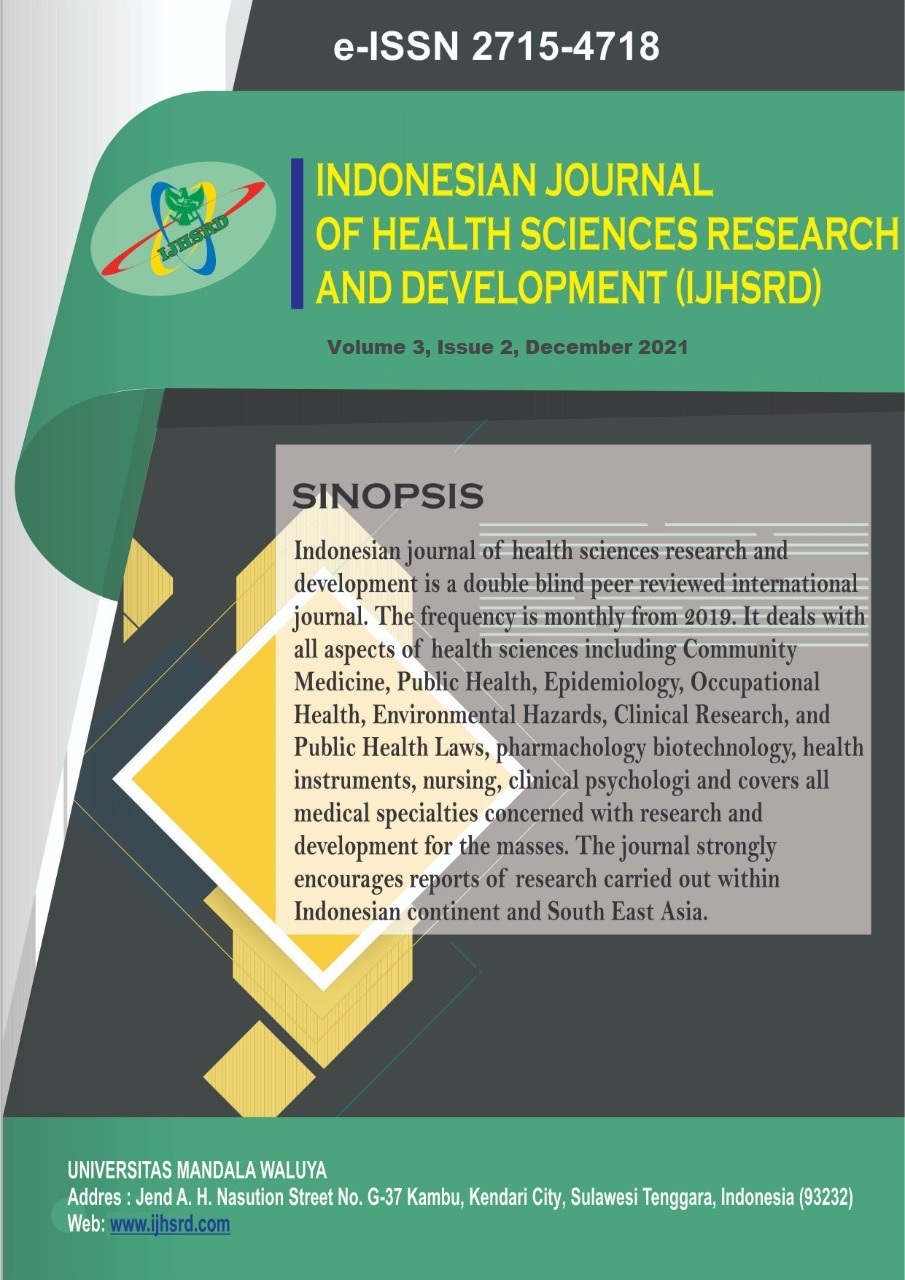Main Article Content
Abstract
Background: Management of medical B3 waste during the COVID-19 pandemic is still very limited.At the Kendari City Regional General Hospital. B3 waste generation has increased from 24.324 kg in 2019 to 32.123 kg in 2020. In April 2021, the amount of B3 waste generation has reached 11,402 kg.There were several factors that affect the management of B3 waste. This study aims to determine the factors related to the management of hazardous and toxic waste (B3) at the Covid-19 Referral Hospital in Kendari City.
Methods: This research used a cross sectional study design, conducted from August to September 2021. The samples in this study were 79 respondents taken by purposive sampling.
Results: The statistical test suggests the value of X2count is 19,417 > X2 table is 3,841 and the value of the closeness relationship is Ф= 0,496.
Conclusion: There is a moderate relationship between monitoring of management of hazardous and toxic waste (B3) at the Kendari City Covid-19 Referral Hospital.
Keywords
Article Details

This work is licensed under a Creative Commons Attribution-ShareAlike 4.0 International License.
References
- Muhyiddin M, Nugroho H. A Year of Covid-19: A Long Road to Recovery and Acceleration of Indonesia's Development. Journal of Development Planning: The Indonesian Journal of Development Planning. 2021;5(1):1–19.
- Indonesian Ministry of Health. Guidelines for Waste Management for Referral Hospitals, Emergency Hospitals and Health Centers that Handle Covid-19 Patients. Jakarta: Indonesian Ministry of Health; 2021.
- public health Office Southeast Sulawesi Province. COVID-19 Information & Coordination Center. Kendari: Southeast Sulawesi Provincial Health Office; 2021.
- Kendari City Health Office. COVID-19 information. Kendari: Kendari City Health Office; 2021.
- World Health Organization. Health-care waste. Geneva: World Health Organization; 2020.
- Astuti LT Challenges in Handling Medical Waste in the Covid-19 Era In Jakarta: Indonesian Environmental Scientists Association; 2020.
- KLHK. LetterCircular No. SE.2/MENLHK/PSLB3/3/2020 concerning Management of Infectious Waste (B3) and Household Waste from Handling Corona Virus Disease (COVID-19). Jakarta: Ministry of Environment and Forestry RI; 2020.
- Kendari City Hospital. Hazardous Waste Management Report. Kendari: Kendari City Hospital; 2021.
- Notoatmodjo S. Science & Art of Public Health. Jakarta: Rineka Cipta; 2014.
- Sugiyono. Quantitative, Qualitative, and R&D Research Methods. Bandung: Alphabeta; 2019.
- Hermawan I. Educational Research Methodology: Qualitative, Quantitative, and. Mixed Method. Brass: Hidayatul Quran; 2019.
- Manullang. Fundamentals of management. Jakarta: Ghalia Indonesia; 2014.
- Kurniawan B. Supervision of Hazardous and Toxic Waste Management (B3) in Indonesia and its Challenges. Dynamics of Governance: Journal of State Administration. 2019;9(1):39–49.
- Uska R.D. Supervision of Medical Waste of Hazardous and Toxic Materials, Selasih Regional General Hospital, Pelalawan Regency. Let's Fisip. 2019;6(2):1–19.
- Amelia L, Jayadipraja E.A., Surya R.A. Management Waste in The Public Service Area of The Southern Konawe Hospital. HYGIENE: Journal of Environmental Health. 2018;4(3):131–136.
- Andiasa I.N. Overview of Medical Waste Management at Bangli General Hospital in 2020 [Thesis]. [Denpasar]: Denpasar Health Polytechnic; 2020.
